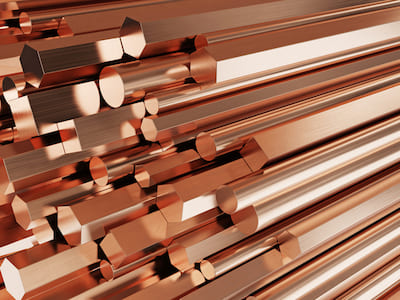Exploring the Versatility and Resilience of Innovative Copper Products in Modern Layout
Exploring the Versatility and Resilience of Innovative Copper Products in Modern Layout
Blog Article
Exactly How Copper Products Add To Lasting Practices in Various Sectors
In sustainable power systems, for instance, copper enhances the functionality of solar and wind modern technologies, while its application in building and construction minimizes waste with longevity. As industries look for to adopt even more sustainable methods, the role of copper could prove essential in accomplishing environmental objectives.
Copper in Renewable Resource
Copper plays an important function in the improvement of sustainable power technologies, working as a crucial conductor in numerous applications. Its phenomenal electrical conductivity and resistance to corrosion make it an ideal material for electric circuitry, which is vital in solar panels, wind generators, and energy storage systems. In solar photovoltaic or pv systems, copper is used in the interconnections and circuitry, making it possible for reliable power conversion from sunlight to electrical energy.
In wind power, copper is important to the generators and transformers that transform kinetic power into electric power, making sure ideal efficiency and dependability. The need for electrical automobiles (EVs) is raising, with copper being an essential component in batteries, motors, and charging infrastructure. The shift to EVs substantially enhances the need for copper, as these automobiles normally utilize 4 times a lot more copper than traditional inner combustion engine automobiles.
As the world looks for to mitigate environment modification and change to lasting energy resources, copper's function becomes increasingly critical. The material not only enhances the efficiency and sturdiness of eco-friendly energy systems however likewise supports the broader objective of decreasing greenhouse gas emissions and advertising a sustainable future.
Eco-Friendly Construction Materials
In recent times, there has been a significant shift in the direction of the fostering of environment-friendly building and construction products in response to growing ecological issues. This adjustment is inspired by the need for sustainable options that minimize environmental impacts while preserving architectural integrity and visual charm.
Copper, recognized for its longevity and recyclability, has actually arised as a crucial player in this field. It can be made use of in roof covering, plumbing, and electrical systems, adding to energy efficiency and minimizing waste. Copper's longevity means fewer substitutes gradually, additional improving its sustainability profile.
Additionally, products such as bamboo, recovered wood, and recycled steel are acquiring appeal. These alternatives not just supply lowered environmental effect however additionally promote resource preservation. As developing codes increasingly emphasize sustainability, builders and architects are integrating these products right into their tasks, promoting advancement in design.
The increasing fostering of green building products reflects a more comprehensive commitment to sustainability in the constructed atmosphere. By prioritizing these materials, the building and construction sector can considerably minimize its carbon impact, straighten with governing criteria, and sustain a healthier community for future generations. This fad marks a critical step towards an extra sustainable future in building and construction.
Copper's Function in Healthcare
Current researches have highlighted the substantial duty of copper in medical care setups, particularly because of its antimicrobial residential or commercial properties. Copper surface areas have been revealed to reduce the existence of microorganisms, including bacteria and viruses, by up to 99.9% within a brief duration. This exceptional efficacy makes copper an indispensable product for high-touch surfaces in healthcare facilities, such as doorknobs, bed rails, and IV poles, therefore contributing to improved infection control actions.
Along with its direct antimicrobial effects, copper likewise contributes in the broader context of hospital sustainability (Copper Products). By incorporating copper right into clinical equipment and home furnishings, medical care centers can decrease the incidence of healthcare-associated infections (HAIs), which not just enhances person results but additionally lowers the prices associated with prolonged hospital remains and added treatments
Additionally, copper's longevity and recyclability straighten with sustainable techniques, allowing for accountable resource management. As medical care systems significantly focus on both individual safety and security and ecological stewardship, the integration of copper items is coming to be extra widespread. This double benefit highlights copper's vital contribution to a much healthier, safer, and much more lasting health care setting.
Sustainability in Transport

Additionally, copper's resilience and corrosion resistance add to the longevity of transport framework (Copper Products). In rail systems, for instance, copper elements enhance the integrity and effectiveness of signaling and power systems, important for decreasing delays and power intake. In addition, copper's function in renewable energy systems, such as solar and wind, supports lasting transportation remedies by supplying tidy energy for electrical transit choices
Investments in copper technology not just foster sustainability yet also stimulate financial development and task development in environment-friendly markets. As industries aim to fulfill rigorous environmental policies, the application of copper items in transportation arises as an essential approach in attaining sustainability objectives and promoting a cleaner, a lot see this page more efficient future.
Copper and Circular Economic Climate
As the world significantly embraces sustainability, the role of copper in the circular economy comes to be ever before much more considerable. Copper's inherent residential properties-- such as its recyclability, conductivity, and durability-- position it as a key material in a resource-efficient economy. The circular economy intends to reduce waste and optimize source use with recycling and reusing materials, and copper master this respect.
The steel can be reused indefinitely without loss of high quality, making it a perfect candidate for sustainable techniques throughout different sectors, consisting of building and construction, electronics, and renewable resource. By recouping and reprocessing copper from end-of-life items, industries can considerably minimize the demand for virgin materials, consequently decreasing environmental effects related to mining and processing.
Moreover, the assimilation of copper into circular economy frameworks not only preserves resources yet also fosters development. Services that focus on copper recycling add to a more sustainable supply chain, boosting their competitiveness while lining up with governing demands and consumer preferences for environmentally accountable products.
Verdict
Finally, copper products considerably add to lasting methods across numerous sectors. Their vital function in boosting renewable resource innovations, advertising green building and construction materials, supporting infection control in medical care, assisting in sustainable transport, and embodying the concepts of a round economy underscores the versatility and value of copper. By integrating copper into different applications, sectors can accomplish higher performance, reduce environmental effect, and align with global sustainability objectives, ultimately promoting a much more sustainable future.

Copper's exceptional conductivity makes it a favored product in electric car (EV) systems, boosting power efficiency and efficiency. Additionally, copper's role in browse around here renewable energy systems, such as solar and wind, supports sustainable transport remedies by giving clean power for electric transit choices.
Their important role in improving renewable energy innovations, promoting green construction products, supporting infection control in health care, assisting in lasting transportation, and symbolizing the concepts of a circular economic situation highlights the convenience and importance of copper.
Report this page